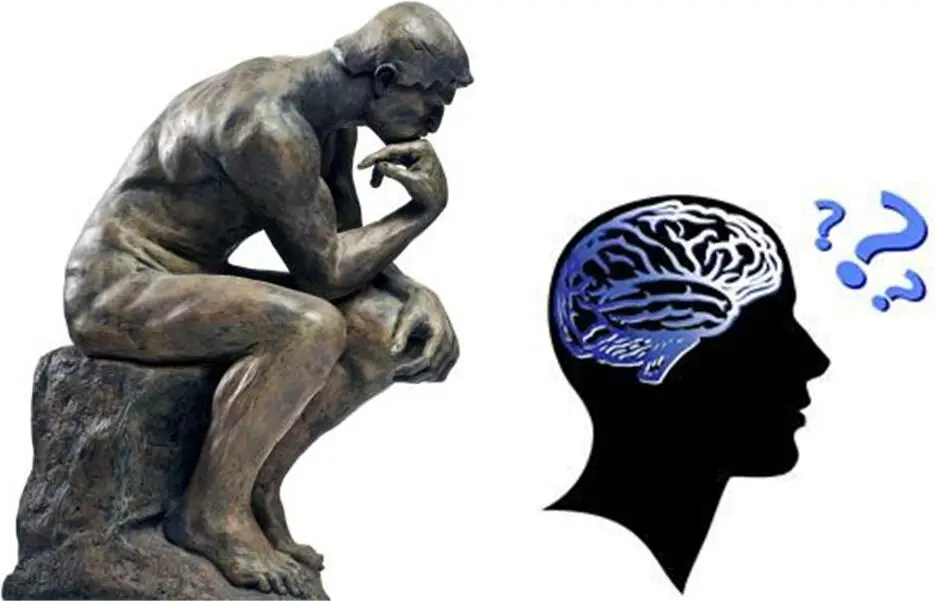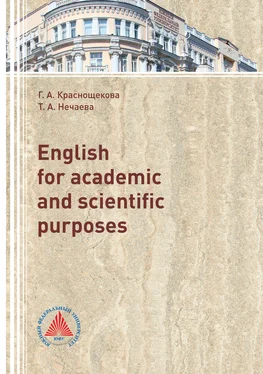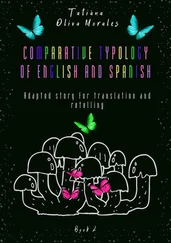Галина Краснощекова - English for academic and scientific purposes
Здесь есть возможность читать онлайн «Галина Краснощекова - English for academic and scientific purposes» — ознакомительный отрывок электронной книги совершенно бесплатно, а после прочтения отрывка купить полную версию. В некоторых случаях можно слушать аудио, скачать через торрент в формате fb2 и присутствует краткое содержание. ISBN: , Жанр: Детская образовательная литература, на русском языке. Описание произведения, (предисловие) а так же отзывы посетителей доступны на портале библиотеки ЛибКат.
- Название:English for academic and scientific purposes
- Автор:
- Жанр:
- Год:неизвестен
- ISBN:9785927525508
- Рейтинг книги:4 / 5. Голосов: 1
-
Избранное:Добавить в избранное
- Отзывы:
-
Ваша оценка:
- 80
- 1
- 2
- 3
- 4
- 5
English for academic and scientific purposes: краткое содержание, описание и аннотация
Предлагаем к чтению аннотацию, описание, краткое содержание или предисловие (зависит от того, что написал сам автор книги «English for academic and scientific purposes»). Если вы не нашли необходимую информацию о книге — напишите в комментариях, мы постараемся отыскать её.
English for academic and scientific purposes — читать онлайн ознакомительный отрывок
Ниже представлен текст книги, разбитый по страницам. Система сохранения места последней прочитанной страницы, позволяет с удобством читать онлайн бесплатно книгу «English for academic and scientific purposes», без необходимости каждый раз заново искать на чём Вы остановились. Поставьте закладку, и сможете в любой момент перейти на страницу, на которой закончили чтение.
Интервал:
Закладка:
При работе с пособием преподаватель сам может определить конкретные методические приемы в зависимости от уровня подготовки магистрантов и целей обучения. Разделы могут изучаться в представленной последовательности или выборочно. Тематика и характер текстов и заданий пособия обеспечивают формирование у магистрантов умений и навыков профессионального общения.
Unit 1. Mind and Brain
Lead-in:
A computer required hardware to perform its function. In addition, the hardware need software to make it run. Without software, hardware would be useless and without hardware, software cannot be used. Brain is like the hardware and mind is like the software. However, in reality, the difference between brain and mind are more complicated than software and hardware.
In our culture, we sometimes use the words brain and mind interchangeably even though they really do refer to separate, although often overlapping, concepts. The brain is an organ but the mind is not. The brain is the physical place where the mind resides. The electronic impulses that create thought are contained in a vessel. With the brain, you coordinate your moves, your organism, and your activities and transmit impulses. However, you use the mind to think. You can muse at what happened, what is scheduled and what maybe will happen.
The mind is the manifestations of thought, perception, emotion, determination, memory and imagination that takes place within the brain. Mind is often used to refer especially to the thought processes of reason. (1)
Pronunciation:
Task 1
Memorize the pronunciation of the following words.
retrieve [ rɪˈtriːv ]
reshuffle[ riːʃʌflˌ ]
discern [ dɪˈsɜːn ]
prominent [ prɒmɪnənt ]
impartial [ ɪmˈpɑː.ʃəl ]
grasp [ ɡrɑːsp ]
expectation [ˌekspekˈteɪʃn ]
plethora [ ˈpleθərə ]
immovable [ ɪˈmuːvə.blˌ ]
response [ rɪˈspɒns ]
imbalance [ ˌɪmˈbæləns ]
alter [ ˈɒltər ]
Word study:
Task 2
Form the necessary parts of speech.
Pre-reading:
Task 3
Answer the following questions before reading the text.
1. What springs to your mind when you hear the words “brain” and “mind”?
2. Where does your brain stop and your mind start?
3. Do computers have brain?
4. What is the most mindless job you have ever done?
5. Have you ever been in two minds about anything?
6. Who is the brainiest person you know?
7. Is there a time when you went out of your mind with anger or worry?
8. Can you think of something difficult you were able to do when you put your mind to it?
Reading A
Task 4
Read the text and be ready to discuss it.

The human brain, then, is the most complicated organization of matter that we know.
Isaac AsimovThe brain – reactive
Mind- Proactive, an emotional scale
Everything is always suspended in the mind until received – manifested through opinion, expectation, or intention.
The brain functions on a logical systematic process similar to a computer. Information is stored and retrieved as a computer. The long-term memory can be viewed as the hard drive whereas short-term memory is the RAM. The eyes can be seen as the monitor, as you may have already noticed there are literally billions of operations processed to come up with the picture we see. The brain is impartial and does not take a position on any of its activities and as if the body simply reacts to environmental cues. The brain cannot tell the difference between imagination, such as a dream, or reality. If you close your eyes and imagine ordering a pizza and then you open your eyes and actually order the pizza, your brain will go through the exact same electrical process, accessing the exact same parts of the brain in the same order. It is the mind that gives the difference between the two states by attaching to it a certain sequence of emotional insurrections, drawn from an emotional scale, based on your position on an event (do I like or dislike etc…) this is opinion, expectation, or intention.
It is the act of trying to reconcile the mind and the brain, which is the poison of humanity.
The mind is not the brain although the mind is what structures the brain. The individual is neither the brain nor the mind but the embodiment of the process by which the two interact. Imagine there to be a current of energetic movement passing like sand through an hourglass.
As sand falls through the hourglass, it is important to observe the forces that perpetuate or restrict its motion. The mass of the sands matter in conjunction with the gravitational pull of the much larger body of matter beneath will determine how quickly the sand passes through the hole. The smaller the hole the slower the flow until the hole gets so small that a single grain of sand stops the entire flow altogether.
In contrast, if the hole opened wider the sand would flow faster until the sand would start to pass completely unrestricted. Now take a moment and picture this hourglass in an infinite pile of sand that appears to be coming from a bright light and slowly materializing into its grains; these are all possibilities coming into fruition, the future.
Below is a massive pile of sand, the result of a lifetime of outpouring; much larger than the mass above but still disappearing into the same body of light, this of course is all the memories, fragments of familiarity and conditioning, the past.
A lot of spiritual practice and psychological methodology is trying to take one part of the mind and have it deal with another part of the mind. There is never any real progress as all you get is a lot of reshuffling in the mind. This is what predominantly happens in any sort of therapy, but the mind cannot resolve the mind as the mind is never trying to be anything.
It is important to recognize that one perfect sense (emotion) is divided into five sensory perceptions (empiricism). Memories that are more prominent in the brain are easier to remember or recall because they are of higher emotional intensity. For example on September 11, 2001, everybody knew exactly where he or she were, what he or she were doing, who was around them, what they were wearing etc… Because of how emotionally intense it was when the two towers came down, it created a state of super focus. As was the same when JFK was assassinated, when your child was born, or when a loved one died.
The five senses all act in the same way; you will be able to recall intimate details of a certain moment if there was a distinctive smell, an abnormal sight, a loud noise, an odd taste or a weird feeling (touch). These will serve in the same way as markers of previous statements of position. For example if you have a moment that you find yourself in emotional turmoil feeling the loss of a person in your life you may remember times in your life when you felt connected, but you will notice that even the memory will be primarily held in place by one sense… a lot of the time it is sight. A picture will immediately bring an emotional response. It can be any of the senses though, for example if you recall an intense session of lovemaking it will be more the sense of touch that will hold the moment in place…
Читать дальшеИнтервал:
Закладка:
Похожие книги на «English for academic and scientific purposes»
Представляем Вашему вниманию похожие книги на «English for academic and scientific purposes» списком для выбора. Мы отобрали схожую по названию и смыслу литературу в надежде предоставить читателям больше вариантов отыскать новые, интересные, ещё непрочитанные произведения.
Обсуждение, отзывы о книге «English for academic and scientific purposes» и просто собственные мнения читателей. Оставьте ваши комментарии, напишите, что Вы думаете о произведении, его смысле или главных героях. Укажите что конкретно понравилось, а что нет, и почему Вы так считаете.












